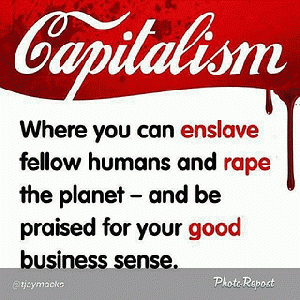Capitalism has many faces. That's the message of Thomas Piketty, whose book, Capitalism in the Twenty-First Century, is making right wingers crazy, and clearing the inventory shelves of Amazon. The big message people are taking from his book is that capitalism as it now exists will produce income inequality.
Piketty has put a scientific face on what we've pretty much known already.
The detour capitalism has take that has led to the development of ultra-wealthy individuals could be a dead end-- a dangerous detour that could disrupt capitalism as the world has known it.
This may be a message we, the ninety-nine percent can use against the billionaires, ultra-wealthy and the transnational corporations mutating capitalism to something that threatens the planet.
Reading Naomi Klein's book Disaster Capitalism opened my eyes to the idea that there are different kinds of capitalism, and that some of them can be malignantly evil and toxic. I asked Naomi to describe the basic concept of Disaster Capitalism. She replied, in an interview on my radio show,
"the thesis of the book is that if we want to understand how this radical "market fundamentalism" has swept the globe, the system that has imploded before our eyes, the de-regulated system that has been so profitable for the people at the top but something of a disaster for everyone else.If we want to understand how this system has swept the globe from Latin America to Russia to this country, we need to understand the incredible "utility of crisis" to this project, because the great leaps forward for this project have taken place in the midst, during the immediate aftermath of some kind of a shock.
The extreme cases that I discuss in the book are wars, terrorist attacks, natural disasters, but overwhelmingly, the most common shocks that have created the context for pushing through these very unpopular policies in a way that economists often call "economic shock therapy," the first shock is the economic crisis, the second shock is the economic shock therapy; overwhelmingly the shocks have been economic crises, whether it's the Asian financial crisis in 1987 or the economic crisis in the former Soviet Union that created this sort of panic atmosphere where they could impose economic shock therapy, so we are in one of those moments of shock.
In the book, I quote a Polish human rights activist in 1989 describing what it was like in that country when they were living through a very profound economic crisis. They became the first Eastern Bloc country to be prescribed shock therapy, and as she said, "We're living in 'dog years' (laughs) not human years, which is to say it's this fast forward intense period where you can barely keep up and I think we are living in dog years at the moment."
A conversation I had with Thomas Frank a few years after Klein's Disaster Capitalism came out got me thinking further about how there are different kinds of capitalism-- some that really helped the middle class. Frank had just written a book, Pity the Billionaire, and he described how, after the crash of the 1930's people got together and demanded economic cleanups. Capitalism, for the next forty years started to serve the middle class.
Yes capitalism is not some sacrosanct, one version, monolithic economic model.
The question is, who steers the ship of capitalism? Who decides what model of capitalism dominates?
What we know today is that capitalism is not working for more than 99% of the people on this planet. When capitalism is not working it increases the problems that make a more dangerous, less stable world-- hunger, poverty, inequality, police states, corrupt judicial systems with different laws for elites.
When capitalism is warped and abused by a small group, it ruins capitalism for the rest of us.
It's not just about the oligarchs and billionaires and the politicians they buy being greedy. These people are endangering the planet and ruining capitalism. Ruin of capitalism will also mean ruination for big corporations too.
Ruining capitalism? Yes, Capitalism the way Roosevelt sculpted it, capitalism with 92% top earner tax rates under Dwight Eisenhower-- those were capitalist models that worked to raise the middle class and strengthen industry. Capitalism in the 1960s included publicly owned utilities, water companies, public transportation-- it was a hybrid of capitalism with socialism-- as we now have with medicare and road construction and public schools.
(Note: You can view every article as one long page if you sign up as an Advocate Member, or higher).






